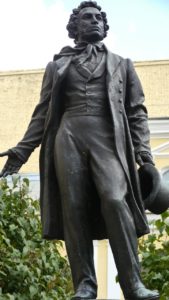 A young lady came up to me during last week’s Great Homeschool Convention in Fort Worth, Texas. A high-schooler, she is taking our Imperial Russia course and had recently passed the milestone unit on Pushkin. Aglow, she told me how excited she was to have discovered the existence of the hither-to unfamiliar author Alexander Sergeevich Pushkin (1799-1837). She was captivated both by the story of his life (and death), and by his writings, in particular his pithy, monumental novel-in-verse Eugene Onegin.
A young lady came up to me during last week’s Great Homeschool Convention in Fort Worth, Texas. A high-schooler, she is taking our Imperial Russia course and had recently passed the milestone unit on Pushkin. Aglow, she told me how excited she was to have discovered the existence of the hither-to unfamiliar author Alexander Sergeevich Pushkin (1799-1837). She was captivated both by the story of his life (and death), and by his writings, in particular his pithy, monumental novel-in-verse Eugene Onegin.
Then she did something that generally only a Russian would do. She pulled a copy of Eugene Onegin out of her backpack. “Probably this is strange,” she said shyly, ”but I’ve been carrying it around with me ever since I found out about it.”
I, of course, jumped up and down and gave her a big hug. Eugene Onegin holds such important status in Russian culture, one akin to a volume of “The Complete Plays of William Shakespeare.” Its seemingly ordinary story and unique poetic structure became a launching pad for much of the subsequent development in 19th-century Russian literature, from Turgenev to Tolstoy. Pushkin’s characters, particularly his cynical, yet vulnerable Onegin and the delicate, heroic Tatiana, still inspire passionate discussion among today’s Russians. When you add in Pushkin’s tragic plays such as Boris Godunov, his incomparable lyrical poems, his short stories like The Captain’s Daughter and The Shot, and his beguiling accounts of ancient fairy tales, well, you have a powerhouse!
And yet, English speakers, particularly in America, frequently have not heard of him. I’ve almost decided that, next conference season, I will present a talk called “Pushkin: Russia’s Most Important Voice.” What do you think? Will it catch people’s attention?
But for now, let me just tell you how marvelous it is to witness a teen falling head-over-heels in love with a piece of literature. In the educational circles I now occupy, one frequently sees young people enamored with classics such as The Odyssey or The Confessions of St. Augustine.
But Pushkin? Not so often. Not nearly often enough.
So, while it was one vignette from a busy conference filled with talks and streams of conversations, I want to tell this young lady (whose name, alas, I did not get) that she made my day. Please contact me again. Let’s meet up and open our copies of Eugene Onegin together, reading out loud Pushkin’s most tender (or most outrageous) commentary about his iconic characters, and particularly his beloved “Tatiana.”




I would listen to that lecture!
I took some Russian in college and had not heard of Pushkin before that, but many of the translation exercises mentioned him. I will never forget the fictional Boris staggering around his room, wailing about Pushkin’s tragically early death! Now, of course, I’ve read a good deal.
Oh, yes, do the Pushkin talk! That’s a name I recognize, but I really know nothing about him, and I’m pretty sure I’ve never read anything by him.
What is the youngest age person for whom this novel is appropriate?
Okay, you’re on! I appreciate the “thumbs up.” Love the description of Boris, Jean, and yes that’s an amazing scene. Couldn’t be topped,unless we consider what Musorgskii was able to do with that scene in his operatic version. Great stuff.
JA, regarding your wonderful question, I would say that the appropriate age for this story is the same age as for Jane Austin or Thomas Hardy. Plus, the student would need to have the necessary curiosity and patience for traveling through Pushkin’s poetic stanzas which, while in no way difficult, are different from what most kids are used to reading. Hearing the work read aloud, or reading the stanzas aloud, also is good. Young people relate to the characters in one way. Then one spends a lifetime reexamining them, re-thinking their arguments, motives, and conclusions. The work never grows old.